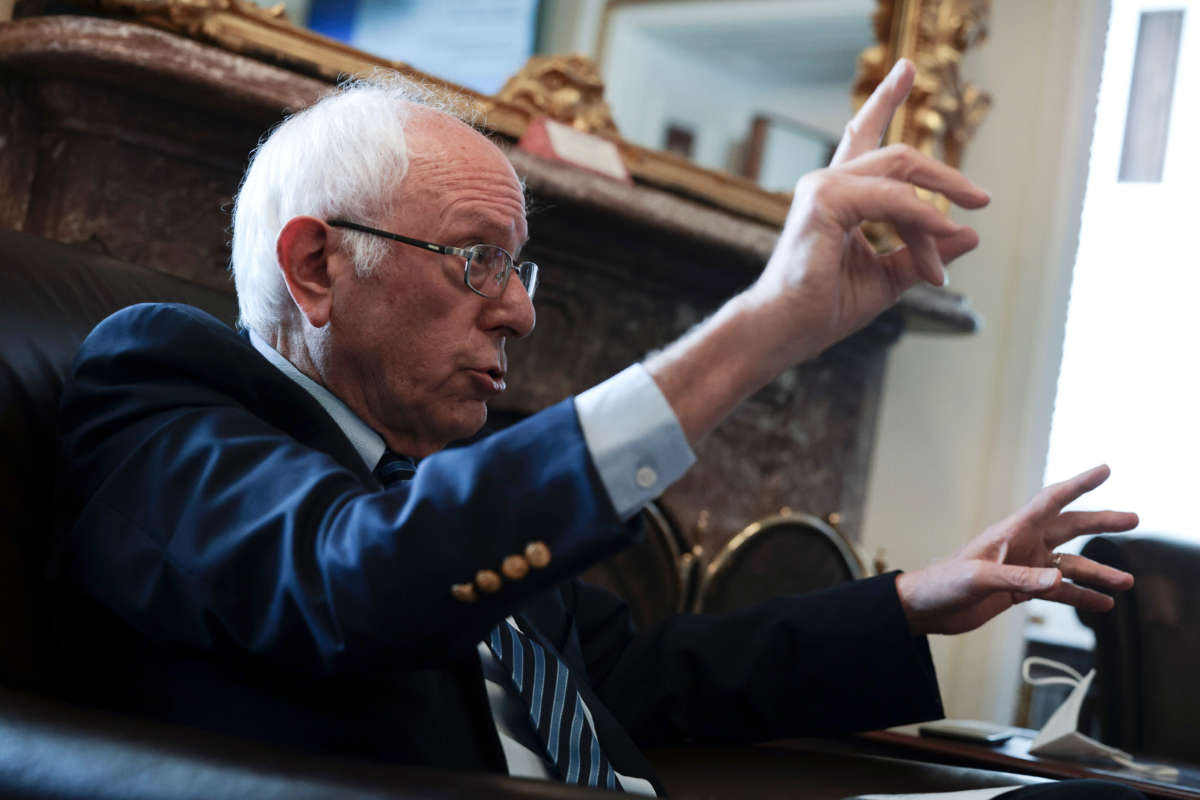After a press conference held by Sen. Joe Manchin (D-West Virginia) on Monday, Sen. Bernie Sanders (I-Vermont) pointed out that the right-wing Democrat’s grievances against the reconciliation bill are hypocritical and based on pretense.
In the brief press conference, after which he took no questions, Manchin complained about the potential cost of the reconciliation bill, urging his colleagues to postpone consideration of the bill until its impact on the deficit — if any — is scored. “I will not support a reconciliation package that expands social programs and irresponsibly adds to our $29 trillion in national debt,” he said. He also said that the bipartisan infrastructure bill that he helped negotiate should come to a vote soon.
Sanders, who is Senate Budget Committee chair, pointed out to reporters after the conference that Manchin’s own infrastructure bill would add to the national debt. “The infrastructure bill runs up a $250 billion deficit over a 10-year period,” Sanders said, citing the Congressional Budget Office’s estimate that the bill would add $256 billion to the deficit. “It’s not paid for.”
On the other hand, the reconciliation bill is fully paid for, according to legislators’ estimates. “The legislation that I want to see passed, which includes lowering the cost of prescription drugs, expanding Medicare, including paid family and medical leave, is paid for in its entirety,” Sanders said. “It will not have an impact on inflation.”
The latest draft of the reconciliation bill from the White House contains $1.75 trillion in childcare, health care and climate investments. With almost $2 trillion in offsets like a minimum corporate tax and investments in the Internal Revenue Service (IRS) to prevent tax cheating, the government would actually come out ahead.
Ironically, the reconciliation bill is estimated to bank around $250 billion over the next 10 years, which is nearly enough to pay for the deficit that the infrastructure bill would add. The original draft of the bill that Manchin so vehemently opposed, valued at $3.5 trillion, was also fully funded. Of course, Manchin still won’t commit to voting for the Build Back Better Act, despite getting nearly everything he demanded in negotiations.
Rep. Katie Porter (D-California) has condemned Manchin’s opposition to the bill’s price tag, saying, “I think it’s dead-on fiscally irresponsible for Senator Manchin to refuse to raise revenue and at the same time out of the other side of his mouth — maybe the side of his mouth that he uses to talk to his corporate donors — complain that we can’t pay for the things that American families desperately need.”
With the inclusion of key provisions, the reconciliation bill has the potential to be transformative for the country’s social safety net and in reducing carbon emissions — and considering Manchin’s support of other costly proposals, his stance on the bill is hypocritical.
Manchin has voted to approve over $9 trillion in defense spending over the past ten years and is fighting to include at least $121 billion in subsidies for the fossil fuel industry. He’s also opposed key proposals like raising taxes on corporations, a billionaire tax and IRS reform plans, all of which would help offset the cost of the reconciliation bill.
Under his leadership, the bipartisan group that was negotiating the infrastructure bill nixed nearly all of the measures that would have funded the infrastructure bill, leaving half of the new spending unaccounted for.
As some commentators have noted, by focusing on taxation and the deficit, rather than the massively popular and transformative proposals contained in the bill, Manchin has sidestepped having to announce his opposition to many of the bill’s most sought-after proposals.
Join us in defending the truth before it’s too late
The future of independent journalism is uncertain, and the consequences of losing it are too grave to ignore. To ensure Truthout remains safe, strong, and free, we need to raise $46,000 in the next 7 days. Every dollar raised goes directly toward the costs of producing news you can trust.
Please give what you can — because by supporting us with a tax-deductible donation, you’re not just preserving a source of news, you’re helping to safeguard what’s left of our democracy.
